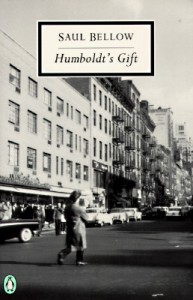 Drifting Along Some Fine Writing
Drifting Along Some Fine Writing
Bellow, Saul. (1973). Humbolt’s Gift. New York: Penguin.
The story is about the life of a New York City writer who makes it big, but is haunted by the memory of his writing mentor, Humbolt, who taught him everything, then later scorned him for his commercial success. The story is told first-person, past tense, by Charlie Citrine, the young writer. For most of the book he reminisces about his friend Humbolt, and what he taught him, and meant to him. Along the way, he waxes existentially philosophical about life and especially about the artist’s place in modern society. This is done with fine language and often fine humor.
The characters are unique, full of idiosyncracies. Citrine is detached, someone who was surprised by his sudden success as a playwright but thinks of himself as an established writer, yet really has no serious ideas and no motivation to write anything else. He feels vaguely guilty about that, but not guilty enough to write anything. Does that mean he has “risen above” the commercial compulsion to perform, or does it mean he is mentally bankrupt?
His lackadaisical attitude extends to his relationships. His wife divorces him and wants a fat settlement, which he sees as a minor annoyance; his girlfriend takes advantage of him, which he suspects, but pretends not to; he gets involved with a mobster who wants him to produce a certain play. The reader is always thinking, “Don’t do it, Charlie! Can’t you see the situation is nuts?” But Charlie doesn’t see anything normally; he’s not quite there. He prefers to withdraw, to ruminate and reminisce, giving the author a chance to pontificate on modern (mid-century) society.
There are some thought-provoking themes to consider. One is about the relationship between a student and a mentor. It can takes a long time to get out from under the shadow of a powerful mentor. Bellow explores this relatively unusual kind of human relationship.
Another theme is the old dichotomy between art for art’s sake, and commercial art. Citrine makes a lot of money with his writing, but that’s “not his fault,” he says. By contrast, Humbolt, his mentor, died penniless. Humboldt wanted to raise the esteem of poets and writers in American society, yet he schemed like a Soviet politician to dethrone an English professor at Princeton so he could take his place. Nearly all of Bellow’s characters, including Charlie, are conflicted and disoriented. Maybe that’s what makes them so fascinating.
While the characters are enjoyable, there isn’t much of a story. Nothing really happens in the novel. Near the end, Charlie learns that Humbolt has bequeathed to him the rights to a screenplay they had written together in their youth (the title’s gift), and that leads to some tension, courtroom drama, and humor. Overall though, the plot is weak to non-existent.
Bellow’s (Charlie’s) observations about American life are dated now. Having Charlie take a helicopter across New York with Robert Kennedy doesn’t generate any frisson today. Comments about Adlai Stevenson and about the Soviet Union don’t hold much irony and actually deaden the narrative. That’s a hazard of writing political and topical issues into a novel. Urgent as they seem at the time, they rarely age well.
The book is an enjoyable read just for the fine writing. You read it as you would a prose poem, not as you would a mystery novel, and you go with the drift of the words and enjoy it for what it is. Bellow won the Pulitzer Prize, the Nobel Prize for Literature, and the National Medal of Arts. He is the only writer to have won the National Book Award for Fiction three times.
